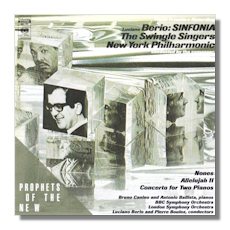
The Internet's Premier Classical Music Source
Related Links
- Berio Reviews
- Latest Reviews
- More Reviews
-
By Composer
-
Collections
DVD & Blu-ray
Books
Concert Reviews
Articles/Interviews
Software
Audio
Search Amazon
Recommended Links
Site News
 CD Review
CD Review
Luciano Berio

Prophets of the New
- Sinfonia for Eight Voices & Orchestra 1
- Nones 2
- Allelujah II 3
- Concerto for two Pianos 3,4
1 Swingle Singers
1 New York Philharmonic Orchestra/Luciano Berio
2 London Symphony Orchestra/Luciano Berio
3 BBC Symphony Orchestra/Luciano Berio
4 Antonio Ballista & Bruno Canino, pianos
Sony 49992
This well-produced CD containing four key works by Luciano Berio (1925-2003) is part of Sony's "Prophets of the New" series. These are representative works of one of Italy's most influential and important composers in the twentieth century.
Sinfonia for eight voices and orchestra uses the word in its original sense: that of sounds together. At the same time, diversity, duplication and repetition – superficially antithetical to the euphony implied by symphony – are central to the workings of the piece. The Swingle Singers and New York Philharmonic Orchestra perform under the composer on a recording made at the time of its composition, in 1968.
They clearly have the measure of the way such tensions lead to a satisfying, if provocative, piece. Three disparate texts (by Levi-Strauss, Martin Luther King and Samuel Beckett – one in each of the first three sections and an amalgam in the fourth) are not printed in the short booklet that accompanies the CD (written by Berio) for a reason central to the operation of the music: Berio was concerned that we should perceive (hear) what we perceive; and no more. "Almost hearing" the texts is valid for Berio. The articulation of the singers is nevertheless clear and communicative. Theirs and the delivery of the instrumental performers is also packed with real force and forward momentum: the famous third Section which quotes from Mahler's "Resurrection" symphony is impressive. It's one of the cleanest yet most compelling of the half dozen or so versions of Sinfonia currently available on CD.
Nones is a much shorter, more angular and concentrated piece. It's the BBC Symphony Orchestra that Berio conducts in 1975, the year in which the original recordings of the other two pieces were first released. "Nones" refers to the ninth and final hour of Christ's agony. The compression of the work reflects this. It's actually Berio's extraction of the purely orchestral episodes in a longer cantata originally conceived as a setting of a poem by Auden. The composer eventually deemed that too complex to stand in its first incarnation. Again, the playing is superb and honors every stroke of Berio's evolution with the piece.
Maybe it was the freshness, the recency of the music, expectation of innovation fulfilled in both new and familiar ways, that give these performances an edge over other accounts on CD since that time. More likely it was the excitement and enthusiasm for new music in the 1960s and 1970s – particularly in Europe and North America. Berio's and Boulez' terse yet penetrating account of Allelujah II with the BBC Symphony Orchestra (of which the latter was chief conductor at the time: golden years!) is the only available recording; this is also the case for Nones. It's a work that – again – has contrast and instability at its core; transformation and the search for rest, perhaps. Yet the performance acknowledges, indeed thrives on, the formal aspects of the music, not any incipient disorder. It must. Economical in the unfolding, yet at the same time sensitive to the characteristics and nuances of every instrumental sound, this recording is a real testament to Berio's achievement.
The Concerto for two Pianos, the longest piece at nearly 25 minutes, is also available in a recording by Andreas Grau, Götz Schumacher, the GrauSchumacher Piano Duo and Vienna Radio Symphony Orchestra under Martyn Brabbins, Stefan Asbury, Bertrand De Billy on Col Legno (20281). That's a more reflective account. This one on Sony is trenchant, contemporary and, although taking no hostages, highly accessible.
Here, then, are four classic recordings from works recently written, in the third quarter of the last century: Nones dates from the early 1950s, the Concerto from 20 years later. They permanently capture the élan, the thrill and sense of musical possibilities of the time. The acoustic on this Sony CD is excellent, despite the recordings' ages. Berio's commentary in the booklet is highly illuminating. In short, whether you lived through those galvanizing years or not, there is much about the world brought back to life by these outstanding performances to make the CD essential – especially since two of the works are otherwise unavailable. The accounts of those which are recorded elsewhere also have something special to convey and should also be considered necessary to any collection of music from the time.
Copyright © 2013, Mark Sealey




















